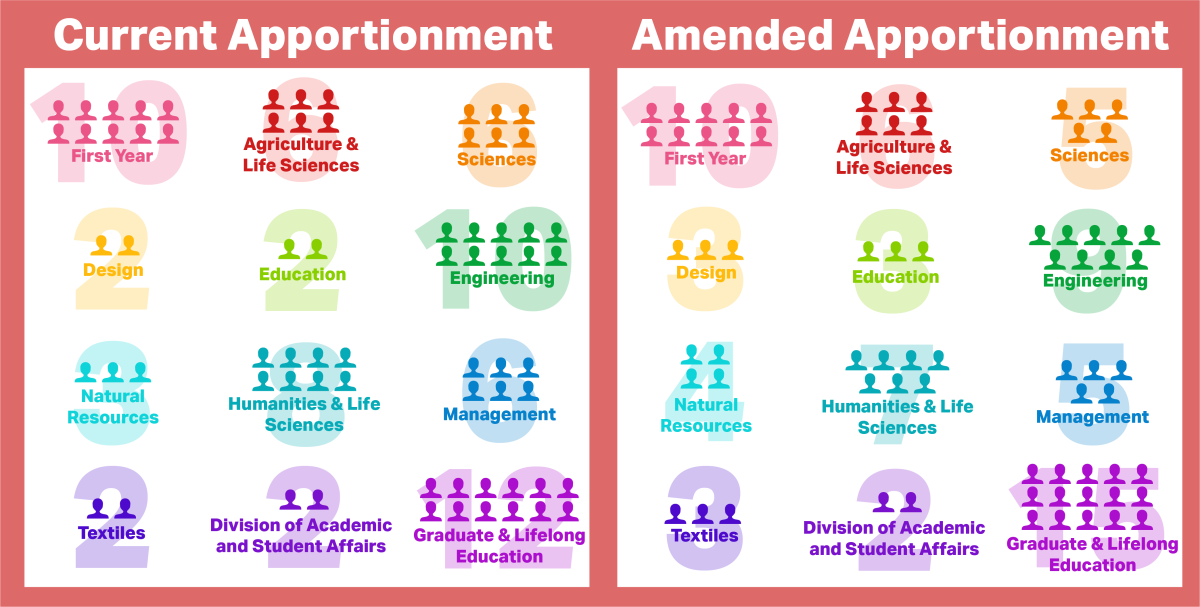On Jan. 23, Student Senate passed their triennial Reapportionment Act, reallocating the number of Senate seats that are designated to every college at NC State for students to run as representatives.
Changes include:
- Graduate and Lifelong Education gained three seats for a total of 15.
- Textiles gained one seat for a total of three.
- Management lost one seat for a total of five.
- Humanities and Social Sciences lost one seat for a total of seven.
- Natural Resources gained one seat for a total of four.
- Engineering lost one seat for a total of nine.
- Education gained one seat for a total of three.
- Design gained one seat for a total of three.
- Sciences lost one seat for a total of five.
- Agriculture and Life Sciences and Division of Academic and Student Affairs did not change, remaining at six and two, respectively.
According to Adam Schmidt, a third-year studying civil engineering and Student Senate president, reapportionment occurs every three years and adjusts the number of seats that each delegation of Student Senate holds in order to remain proportional to the student population.
“According to our statutes, the Student Senate is supposed to reapportion its seats every three years,” Schmidt said. “[Reapportionment] is where they go in and look at the current enrollment numbers and trends of the university, and they determine if the makeup of the Senate should stay the same or reallocate its seats to make sure that we’re still representing students appropriately.”
Melanie Flowers, a second-year studying communication and apportionment committee chairperson, said that this year’s committee used both current enrollment and projections for future growth to redistribute the seats.
“The committee started off looking at enrollment numbers not only for our current enrollment but for our 2020 projection,” Flowers said. “From there, we looked at the percent of the population each college ended up being, and we added and took away seats to meet our 72 senator cap.”
The most drastic change was in the Graduate and Lifelong Education delegation which gained three senate seats and now holds a total of 15.
“[The Reapportionment Act] gave [the Graduate and Lifelong Education delegation] more representation, which they deserve because of their size,” Flowers said. “Hopefully, that means they will have more resources and more of a platform to enact the change that they need.”
Meredith Spence Beaulieu, a Ph.D. student studying entomology and plant pathology and student body vice president, agreed that this was a step toward a more accurate picture of the student body.
“I think the increase in graduate student seats is great from the lens that grad students are almost a third of our student population,” Spence Beaulieu said. “I think that it’s great that we’re inching toward more complete representation.”
However, Spence Beaulieu said that she does worry that increasing the number of Graduate and Lifelong Education delegation representation could lead to empty Senate seats.
“It’s sometimes tough to find graduate students that will even fill the existing Senate seats,” Spence Beaulieu said. “I do wonder if they’re going to have a tough time getting those seats filled. … I would highly encourage graduate students to look into getting involved with Student Government.”
Spence Beaulieu is not the only person hesitant about the number of seats that would be filled due to reapportionment. Schmidt shared that several senators were not in support of the bill because some colleges gained seats, while other colleges lost their seats there was an element of dissatisfaction among the representatives.
Flowers said that some senators were concerned that the mathematical process to redistribute the seats was not an effective method and was destructive.
“People felt like we weren’t transparent enough with our numbers,” Flowers said. “People said it was not a democratic process and that people were misrepresented. There was a lot of frustration, but the numbers have been public to the entire senate throughout the whole process.”
Amidst these concerns, the bill passed and will take effect in the next senate session. This will change how many seats will be up for election in this year’s spring election.
“These seats will be up for election,” Schmidt said. “So if you see this and it makes you frustrated, you can run for Student Government and get involved to change it. If you’re interested in running for Student Government then go to the elections tab of the Student Government website. Filing closes [Feb. 17] at 11 p.m.”








